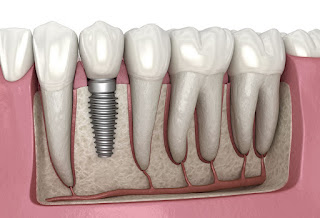Why would you need a dental implant?
- removable dental appliance (complete denture or partial denture),
- fixed dental bridge (cemented), and
- dental implant.
Dentures are the more affordable option for replacement teeth but are the least desirable because of the inconvenience of a removable appliance in the mouth. Furthermore, dentures can affect one's taste and sensory experience with food.
Dental bridgework was the more common restorative option prior to the relatively recent shift to dental implant treatment. The main disadvantage to bridgework is the dependence on existing natural teeth for support. Implants are supported by bone only and do not affect surrounding natural teeth. Deciding on which option to choose depends on many factors. Specifically for dental implants, these factors include
- location of missing tooth or teeth,
- quantity and quality of the jawbone where the dental implant is to be placed,
- health of the patient,
- cost, and patient preference.
A dental surgeon examines the area to be considered for the dental implant and makes a clinical assessment of whether the patient is a good candidate for a dental implant.
There are great advantages to choosing a dental implant for tooth replacement over the other options. Dental implants are conservative in that missing teeth can be replaced without affecting or altering the adjacent teeth. Furthermore, because dental implants integrate into the bone structure, they are very stable and can have the look and feel of one's own natural teeth.
Call us at +1-972-351-9110 or visit familysmilestx.com/ to schedule your appointment.




Comments
Post a Comment